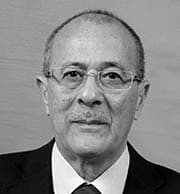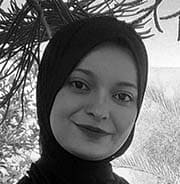As 70-year-old professor Hassan Abu Jarad walks through the ruins of Gaza University, it is as if everything he has fought for has been lost. The buildings have been bombed, the laboratories have been destroyed, and the library has been emptied of books.
“Even our student directories are gone,” he tells Universitetsläraren.
Hassan Abu Jarad is also the vice-chancellor of Gaza University.
“Inside one of the buildings we found a store of unused Israeli bombs. They were using our university to bomb us,” says the vice-chancellor, who is a professor of English linguistics, but perhaps first and foremost a leadership figure in higher education in Gaza.
In 1991, he co-founded al-Azhar University, and in 2007 he founded Gaza University.
“It is not just we who are suffering. Hospitals have been destroyed. Even primary schools no longer function, so we run the risk of the next generation being illiterate,” he tells us solemnly.
“And none of it is random,” says Ghassan Khatib, a former Palestinian minister who is a senior lecturer at Birzeit University in the West Bank. “It has all been systematic. What Israel is trying to do is to bomb our whole future. Palestine needs highly educated people. But now people would rather leave, just like Israel wants,” says Khatib.

Ghassan Khatib
Vice-chancellor of Gaza University and senior lecturer at Birzeit University
The UN now uses the word ’scholasticide’, a variant of the word ”genocide”, to describe the state of education institutions in Gaza. Before the war began on 7 October 2023, the coastal strip had eleven universities. By September last year, according to UNICEF, at least 10,000 students, as well as 411 professors and lecturers, had been killed.
The destruction is so extensive that Khatib believes that most Palestinians would say that Hamas made a huge strategic mistake when it attacked Israel, killing 1,200 people and taking about 250 others to Gaza as hostages.
“It is often the case that the further you get from Gaza, the stronger the support for Hamas. But those who live with Hamas in Gaza know exactly how things are,” he says.
Amid the brutality of war, Professor Abu Jarad and other university teachers have tried to keep the teaching going. Everything is done via Zoom. While lecturers sit with their phones wherever they are – in a tent or in a refugee camp – students follow the lessons on their screens wherever they are. Abu Jarad estimates that they have managed to reach around 70 per cent of the students.
But it is not easy, says Aseel Basheer, a 21-year-old student at the Faculty of Communication. “The internet is often poor. But we will never give up. Education is our only hope. We will show that they cannot crush us. We cling to higher education as if our lives depend on it,” she says.

Aseel Basheer
Student at the Faculty of Communication
Academic freedom, however, has never existed under the almost 20-year-long Hamas regime. No professor has been able to criticise the Islamist movement openly – that would mean arrest, torture or, in the worst case, death. But after 18 months of war, many are beginning to shed that fear, and in recent weeks thousands of Palestinians have demonstrated against Hamas.
One of the key figures in the protests is Professor Hassan Abu Jarad. He has spoken in front of thousands of demonstrators shouting ”Hamas out, Hamas out”. But now Hamas has begun to hit back before the protests spread and grow too large. Hamas arrested one of the protesters, 22-year-old Oday Naser al Rabay, who was then tortured to death. His body was dumped at his family’s front door. This was Hamas’ way of showing that the protests were unacceptable.
Then, Hamas soldiers turned up at Abu Jarad’s home in northern Gaza.
“My life is in danger. They made that clear. I do not really know what to do now,” the vice-chancellor wrote in a text message to Universitetsläraren.
Despite the dangers, he still wants people to know about the threats.
“I am as good as dead in this life,” wrote the 70-year-old professor.
He emphasises that he intends to continue the fight – both against Israel’s warfare and against the Hamas regime in Gaza.
















